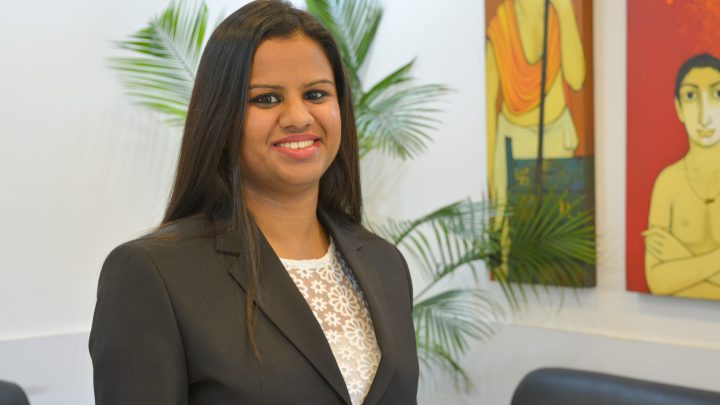Interviews
2171
0
0
“Litigation teaches you to think critically, analyze complex legal matters, and anticipate potential risks, all of which are crucial in identifying compliance issues early on.” – Meenakshy Natesan, Associate Director, Compliance at AB InBev.
This interview was taken by SuperLawyer Team
Posted on May 13, 2025
This interview has been published by Anshi Mudgal and The SuperLawyer Team

Looking back on over a decade in the legal profession, what initially drew you to pursue law as a career? Were there any pivotal experiences or influential figures that shaped your decision to enter the field?
As a first-generation lawyer, I didn’t have any role models within the profession to look up to or draw inspiration from. Interestingly, I had made up my mind as early as middle school that I wanted to pursue law. It wasn’t a particular person who inspired me, but rather the idea itself — the notion of standing up for justice, giving voice to those who needed it, and fighting for someone’s rights resonated deeply with me. Choosing law felt almost instinctive and was one of the easiest and most natural decisions of my life.
One of the most defining moments came when I had to drop out of school in the 10th grade due to an accident that led to some health challenges. During that difficult period, my unwavering wish to become a lawyer became one of the strongest motivators for my recovery and helped me get back on track.
With your rich experience spanning litigation, arbitration, and corporate advisory, what guidance would you offer to young lawyers aspiring to thrive in the legal field? Are there particular habits, skills, or mindsets you believe are critical for a long and successful legal career?
Nothing is more powerful than knowledge. Reading judgments, enactments, commentaries, staying updated with news and articles, attending conferences, and having conversations with knowledgeable people — all of these play a huge role. A lawyer or law student must make continuous learning a habit, because knowledge is ultimately your strongest tool in this profession.
In terms of skills, being able to articulate yourself well — both oratory and written — is absolutely essential, and it is something that needs to be consciously worked on and honed.
I would also stress the importance of preparation. Whether it’s reading up and preparing detailed notes before a hearing, or organizing your thoughts and materials before a presentation to senior management, preparation — or the lack of it — is always very evident.
Soft skills are equally important. Learning to read the room and deliver accordingly is something every lawyer must pick up. Whether it’s presenting a case before a judge, cross-examining a witness, or delivering a presentation in a boardroom, understanding your audience and adapting your approach accordingly makes all the difference.
When it comes to mindset, I believe resilience is key. This profession constantly throws challenges at you, and there will be times when setbacks and failures will dishearten you. Being resilient and persevering through tough phases is critical.
Lastly, empathy towards your clients and stakeholders goes a long way. Understanding their concerns and perspectives not only helps you give better advice but also builds long-term trust.
In the formative years of your career, you had the opportunity to work closely with esteemed lawyers and law firms. What were some of the key lessons or takeaways from that phase that helped shape your legal perspective and skillset?
I truly believe that the first few years of a lawyer’s career are very critical in determining the kind of lawyer you eventually become, and I was fortunate to have had a lot of opportunities and learnings early on. In your initial years, you are like a sponge absorbing everything around you —you learn from lawyers arguing in court while you wait for your matter to be called, from Judges, from clients and even from court clerks.
That apart, I was lucky to have had some extremely knowledgeable mentors, including my first boss, designated Senior Counsel S. Sreevatsa, many senior partners at J Sagar Associates, and several senior counsels whom I had the privilege to brief. After moving in-house, I have once again been fortunate to receive guidance not just from legal professionals but also from the business side and this has only widened my exposure.
What I learnt from seniors in the profession has played a huge role in shaping who I am today. The level of excellence they brought to their work is something I continue to look up to, and serves as a constant reminder that there is a long way to go. Some of the most valuable lessons I picked up were not just about legal acumen, but about character — all the successful lawyers I have known are hardworking, disciplined, and deeply dedicated to their craft. I learnt very early that no amount of skill or technical knowledge can replace these traits.
Another important lesson I carry with me is to never say no to an opportunity. Often, you might be handed a brief at the last minute and the instinct might be to step back out of fear or self-doubt. But I have learnt that it is by stepping up in those moments and by saying yes even when it feels daunting is when you really grow and find your place.
Since we are in a knowledge-driven profession, your strongest asset will always be your ability to learn, and stay updated.
Apart from the bigger lessons, it is also the smaller things that I have picked up from my seniors —even the way a court file is arranged, to how notes are written, to nuances of court craft and argument styles. These are things I have closely observed and tried to emulate, sometimes from one senior and sometimes from a combination of many.
I must also mention that my peers have played an important role in my growth at every stage. In this profession, learning is a continuous journey.
What motivated your move from litigation to corporate roles? How would you compare the challenges and learning opportunities in law firm environments versus corporate legal departments?
They say law is a jealous mistress, and I believe litigation is even more so. While I loved litigating — and it remains one of my greatest passions — after over 11 years in practice, I reached a point where I wanted to broaden my professional experience and gain closer exposure to business decision-making. At the same time, I was also seeking more flexibility and personal time, which an in-house role could offer. The move felt like a natural next step in my career, aligning both with my personal needs and professional aspirations.
Both law firms and corporate legal departments offer tremendous opportunities to learn and grow, though the challenges differ in each. This transition from law firm to corporate has involved as much unlearning as learning.
Law firms cement your foundation with strong knowledge of the law, and instill a great amount of resilience. They train you to understand complex legal matters, develop strong research skills, and build a client-centric approach — all of which equip you for any career in the legal profession.
When I moved in-house, I quickly realized that the approach is not purely legal anymore. It’s about offering solutions that align with the business, focusing on efficiency and risk management rather than just legal theory. In-house roles require you to think like a business partner, not just a lawyer. To provide meaningful advice and mitigate risk effectively, you need an in-depth understanding of the business and its goals. This agility — to quickly understand the industry, the business model, and to work closely with stakeholders from non-legal backgrounds — has been both challenging and rewarding. Another challenge has been understanding financial concepts, which does not come naturally to me, but is critical in order to give well-rounded, commercially viable legal advice.
How does your background in litigation influence your approach to compliance? Are there any particular skills or perspectives that you bring from your past roles that help in your current position?
My experience in litigation has been instrumental in shaping my approach to compliance. Litigation teaches you to think critically, analyze complex legal matters, and anticipate potential risks, all of which are crucial in identifying compliance issues early on. The high-pressure nature of litigation has also honed my ability to stay focused under stress, making it easier to navigate through the complexities of compliance challenges without losing sight of the bigger picture.
You develop a heightened awareness of legal risks and the need to mitigate them before they escalate into bigger problems. This forward-thinking approach is crucial when it comes to creating and enforcing compliance frameworks that protect both the organization and its stakeholders.
Additionally, my experience has taught me the value of clear, effective communication. The skills I developed presenting cases in court — breaking down complex issues into understandable points — now serve me well when engaging with stakeholders. In compliance, it’s crucial to not only convey the legal implications but also guide stakeholders through the practical steps to ensure compliance, and this is something I apply every day in my current role.
Litigation and compliance can be demanding and high-pressure fields. How have you managed to maintain personal well-being and work-life balance over the years?
To be honest, I am still learning how to find that ever-elusive work-life balance. I genuinely love the work I do, and long hours have never really bothered me. However, over time, I’ve realized that there are other important responsibilities and aspects of life that deserve equal attention.
What has helped me the most is detailed planning and setting up structured systems to organize my life. I make lists for almost everything — from professional tasks to personal errands — and this habit of organizing and noting things down frees up a surprising amount of time and mental space.
If I’ve made a mistake along the way, it’s in not giving enough priority to personal health and well-being. That’s an area I am actively working on, and something I would strongly advise others not to neglect. Prioritizing exercise, rest, and overall wellness is absolutely essential, no matter how busy your professional life gets.
Another crucial skill for a lawyer is learning to manage stress effectively. We operate in a challenging, high-pressure environment, and unless you consciously develop healthy ways to manage stress, it can quickly take a toll. Finding strategies to protect your mental and physical health is not just important — it’s vital for long-term success and sustainability in this profession.
Get in touch with Meenakshy Natesan –







No comments yet
Be the first to share your thoughts about this interview.